A Brief History Of Time Travel interview
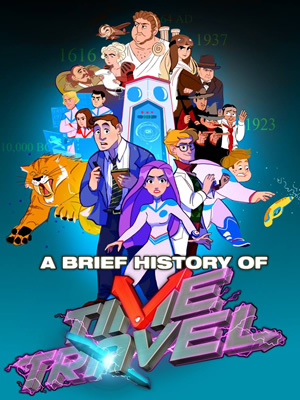
A Brief History Of Time Travel was the first British sitcom project to be successfully financed via Kickstarter, the crowdfunding website. The audio show focuses on an accountant, a genius inventor and a government agent who find themselves stuck in the past with a broken time machine - and worse, stuck with each other.
Backers pledged a total of £5,213 to see a full series of the Radio 4-style sci-fi sitcom created... and the episodes are now here, with Red Dwarf star Robert Llewellyn as the narrator.
BCG caught up with writers and directors James Hunt and Seb Patrick to find out more...
Hi guys. Could we start off by asking you to introduce yourselves and your project?
James: Our background is that we're friends who formed a writing partnership to try and write comedy together, and that (debatably) is what we've done.
The project is a 6-part serial called A Brief History of Time Travel, and it's a radio sitcom that isn't on the radio but is on the Internet.
The story follows the adventures of bored accountant Eric Street, amoral genius Miles 'Professor' Wanderlust and futuristic temporal enforcer Nina Seventeen as they careen through history with nothing but a broken time machine and half-remembered facts off Wikipedia to guide them. Meanwhile, Nina's dim-witted subordinate Oscar Quantum is attempting to mount a rescue attempt, but unfortunately he's not very good with dates. Or words. Or anything, really.
Why did you pick a science fiction audio sitcom as the project you wanted to develop?
Seb: We wrote the first script a few years back, and submitted it to the BBC Writersroom - where, like so many scripts, it was bounced back to us after the initial ten-page read. So the reason behind it being a radio script was partly because that was one of the formats that had an open submissions policy there at the time, and partly because it meant we could write something without having to worry about budgetary constraints.
After tossing around various other ideas and draft scripts in different media over the last couple of years, we decided that we might as well have a crack at actually making something ourselves - and, as a radio project, this seemed like the one we'd be most equipped to have a go at.
As for it being a sci-fi show, it was just something we both zeroed in on pretty quickly. We're both massive nerds, basically. James already had the basic concept for ABHoTT sitting there as a novel he'd started, and I'm a huge fan of time travel stories in general, so it was just a natural fit.
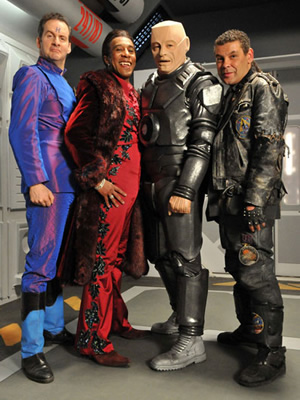
When writing the show did you have to try and consciously make sure you avoided any possible comparisons with the famous sci-fi comedies like Red Dwarf (pictured) and H2G2?
James: Oh, avoid. That's what we should've done!
Er, more seriously, we realised pretty early on that the influences would probably be quite clear to people just from our sense of humour. Plus it's not like there's a huge body of sci-fi sitcoms out there, and they're such towering examples of the genre. We actually leaned into it by referencing them in the trailer just so no-one could accuse us of playing it coy.
There is a lot about the basic setup that's similar to Hitchhiker's: it's a group of misfits freewheeling across time and space in a universe that's coldly indifferent at best and actively belittling at worst. Rather than try and steer away from that, we mostly just tried to avoid thinking about it.
We definitely didn't want to be too often in the position of saying "Well, Hitchhiker's did this, so we should do the opposite..." just because you could go mad trying to avoid any comparison. And, let's face it, Douglas Adams has nothing to fear from us.
Slight diversion: Seb, as editor of the Red Dwarf website you obviously know that series rather well... do you agree with others that it lost its magic in the more recent series?
Seb: It depends what you mean by "more recent", really! All bias aside, even with my critical fan hat on, I really liked the tenth series last year - some episodes more than others, but generally I thought it was hugely satisfying in terms of the characters and plots, and often very funny. And it actually felt like proper Dwarf, that was the important thing.
Was it as good as the show at its best? Not really, no - but then, as far as I'm concerned, the best series was the second, so nothing since 1988 has been as good as its best! That's the thing about Red Dwarf fandom, we can't even really agree on where any perceived decline began - there are long-time fans who downright hate the sixth series, which is nonsense, because it's brilliant. Personally, I'm far less keen on the eighth series than the rest - but that was fourteen years ago, now. Back to Earth and the tenth series were both huge improvements over that, in my view, albeit for different reasons.
I do think with Red Dwarf, though, there's always something to appreciate even when it's not at its absolute best. A lot of fans really don't like Series VII - when it went more comedy-drama and was shot single-camera with a film effect - but I have a sneaking regard for it (especially the JFK episode), partly based on teenage nostalgia, and partly because it's the best the show ever looked visually. It's rare that there's an episode of the show that I can't find some merit in, somewhere.
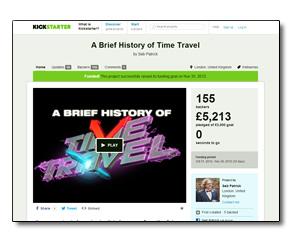
Nice answer. Back to your show: Why did you pick crowdfunding as your method by which to make it happen? Doesn't that put you in 'moral debt' to the backers?
Seb: Well, it means that we had an obligation to deliver the final product to the backers - but the nice thing about crowdfunding is that that's the extent of the contract between the creator and the backers. We didn't have to worry about this making a return, because there's no "investment" as such.
The people that backed the series have already paid to hear it, and they want to hear it however we make it sound - their backing isn't dependent on our doing it a certain way or including, or excluding, certain things. That's pretty liberating, and a rewarding level of trust to have placed in you - if also a little daunting, in that you hope you can justify that faith!
The great thing about crowdfunding, really, is that it strips everything else away - the product, or the idea, or the work, that is the key thing. There's no jumping through hoops to get something made, no investors or commissioners to appease - you reach straight out to the audience that you know, or that you hope, is out there, and find out whether they want to see (or, in our case, hear) your work.
That's not to say there isn't a role in comedy - or anything else - for commissioners and editors. Just that when you're working in a niche, like we are, it makes it possible to actually deliver something without having to go through various barriers of approval.
It must have been a nice feeling when you hit your Kickstarter goal and then exceeded it?
Seb: Completely. It comes back to that thing about finding the audience that are interested in what you're doing, and them placing faith in you. People actually looked at what we were doing and said "Yeah, this is worth backing".
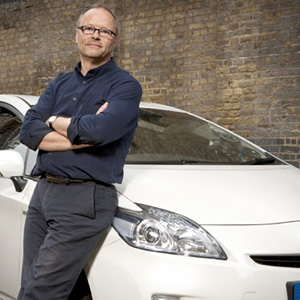
I'll never forget receiving the very first notification that someone had backed the project, about ten minutes after it went online - and it was somebody neither of us knew. They'd obviously just spotted it pop up as a new project on the site. The fact that it did actually get interest from the word go from people who weren't our friends, family or Twitter acquaintances told us that, hey, maybe we weren't deluded losers after all.
How did you get Robert Llewellyn (pictured) to agree to be involved?
Seb: When we came to do the funding campaign, we already had most of the main cast for the series in mind - but we knew that the part of the Narrator would be a good opportunity for a bit of 'stunt casting', a well-known voice who wouldn't have to commit to very much work but could play the important role of being the first and last voice everyone would hear on each episode.
Robert was the first name we thought of, as he's quite known for 'sciencey' sort of programmes anyway (which the fake documentary is supposed to be), and obviously I had a connection because of the Red Dwarf stuff. Plus, I knew that, because he's been recording and releasing his own audiobooks recently (if you haven't read or listened to his The Man in the Rubber Mask memoir, make sure you do, it's brilliant), he'd have the setup at home to record the material with relative ease, rather than having to come in to the studio.
We sent him an email explaining about the series - and linking to the project page, as we had already launched on Kickstarter by that point - and because he is actually The Nicest Man In The World, he got back to us within hours saying that he'd be delighted to do it.
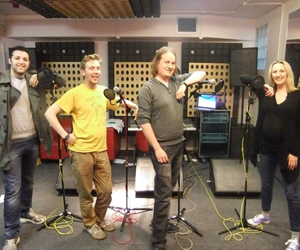
So you've been busy making the show. Could you talk us through how that has gone and what you've spent the extra money you raised on...
James: The money situation was interesting. Having an actual budget was great, because it meant we didn't have to try and convince anyone to work on a potentially-worthless backend deal. Being freelance writers, we're all-too-aware of how hollow the promises of payment in "exposure" or profit-sharing can be.
But yeah, all of the money we raised went straight back into the project. It was really important to us that we didn't look like we were taking a penny more than we needed, and that meant we had to work for free, even if no-one else did. As it happened, some people refused payment which gave us a bit of leeway in what we spent where, but we didn't have to drop anything for being too expensive. An extra day in the studio would've been nice, but that was as much a scheduling issue as anything else.
In terms of unexpected challenges, negotiating with actors' agents was way more difficult than we thought. One of them came at us with a release fee that would've wiped out our entire budget! We had to repeatedly explain that we were effectively hobbyists with a bit of spare cash, not some huge production company trying to take them and their actors for a ride. They got it eventually.
Seb: A bonus of going above our original funding target meant that we were able to do things we hadn't originally budgeted for. For example, in an attempt to keep costs as low as possible, we hadn't budgeted for any original music - but setting it as a stretch goal meant we could afford to bring in MJ Hibbett and the Validators to go into the studio and write and record not just a theme song, but some original incidental cues. And the theme in particular is something I now can't actually imagine the series without.
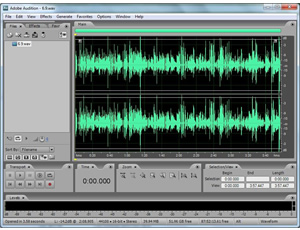
While we've both got some experience as writers, it's the post-production side of things that was new to us. I've worked in news radio and produced podcasts, so I knew that editing the dialogue wouldn't be too difficult - but sourcing and editing in the effects and atmosphere was something of a learning experience. We had assistance with the design of some of the individual effects - and our producer, Rhys Williamson, did a fantastic job of actually making the recorded dialogue sound good before letting us get our hands on it - but we're both such massive control freaks that we wanted it to sound exactly how we wanted it to sound, so there was no real option other than to dig in, get our hands dirty, and learn on the job. On the bright side, this means it's nobody else's fault but ours if any of it sounds a bit crap.
You've opted to release the shows as paid downloads, rather than going for maximum exposure by releasing it as a free podcast, or perhaps taking it to the BBC to see if you can get a broadcast that way. Why is that?
Seb: Well, there's a practical answer first and foremost, which is that we couldn't really give away for free something that we'd "sold" to the Kickstarter backers! We had to make sure that by committing up front to buy it the way those people did, they were being rewarded for that. I'm sure some of them probably backed out of the goodness of their hearts and because they wanted to help us get it made, but it still would have been a bit rude to then give it away free to everyone else!

There's no doubt that having it be a free download would have got it more exposure, like you say - and we hugely admire something like Welcome to Night Vale being out there and available for free - but if we ever wanted to make any more of this, it would cost money, it's not really something we can do on a shoestring. And the mine of goodwill that is Kickstarter feels like something that can only really be tapped once for the same thing! So trying out charging for the series, at least for now, helps us to determine whether or not there's actually a viable paying audience out there for it, who might be interested in hearing some more if we put our minds to it.
What are your plans following this. Is it to leave it there, try and make another audio series, or perhaps develop the show into other mediums too?
James: I'm really keen to do a full novelisation, but I'm about to become a parent so I can't say how likely that is to happen in the immediate future. Either way, I'm confident we'll do more with the characters in one medium or another. We're both comic book fans (that's how we met) so you can bet that if we meet the right artist, we'd do some comic strips or something.
Seb: Without giving too much away, we've deliberately left the series on a note where, if the opportunity came up, it could continue - yet we were also determined that it could exist as a standalone thing with a satisfying narrative conclusion, if these episodes turned out to be all we ever made. Over the course of writing and then recording the series, though, we really became rather attached to these characters and their world, and we certainly have ideas for what we'd like to do if we ever got to play with them again.
It's just a question of whether there's demand, really. If listeners say they want to hear more in this form, then maybe we could do that. If someone shows an interest in wanting to get it into another medium, that's a possibility too. But we're not getting ahead of ourselves. We're pleased enough that we got to make these six episodes, and if they're all A Brief History of Time Travel ever turns out to be, then we're proud of them.
To find out more about the series and download episodes visit abhott.com
Help us publish more great content by becoming a BCG Supporter. You'll be backing our mission to champion, celebrate and promote British comedy in all its forms: past, present and future.
We understand times are tough, but if you believe in the power of laughter we'd be honoured to have you join us. Advertising doesn't cover our costs, so every single donation matters and is put to good use. Thank you.
Love comedy? Find out more